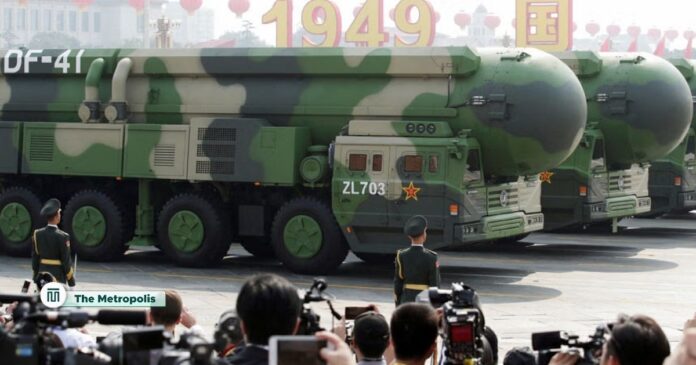For the first time in many years, China claimed to have successfully test-launched an intercontinental ballistic missile into the Pacific Ocean today.
Since last October, Beijing has increased defence spending and advanced its nuclear program. The Pentagon had warned China was building up its arsenal faster than expected.
According to the report, China had over 500 operational nuclear warheads as of May 2023 and expects to have more than 1,000 by 2030.
According to a statement from the defence ministry, the Chinese military’s Rocket Force “launched an ICBM… carrying a dummy warhead to the high seas in the Pacific Ocean at 08:44 on September 25” on Wednesday. The missile then fell into the expected sea area.
Such tests were extremely uncommon, an analyst told AFP.
According to Ankit Panda, Stanton Senior Fellow at the Carnegie Endowment for International Peace, “this is extremely unusual and likely the first time in decades that we’ve seen a test like this.”
“(The test) likely speaks to China’s ongoing nuclear modernization manifesting in new requirements for testing,” he explained.
However, China’s ministry of defence described the dismissal as a “routine arrangement in our annual training plan”.
The statement said, “It is in line with international law and international practice and not directed against any country or target.”
In the 1980s, Beijing fired its first intercontinental ballistic missile test into the South Pacific.
Panda, on the other hand, told AFP that it has generally carried out these tests within its own airspace since then.
The US expressed “great concern” in 2021 over reports that China was testing hypersonic missiles.
In an attempt to reduce mistrust prior to a summit between Presidents Joe Biden and Xi Jinping, the United States and China held unusual discussions on nuclear arms control in November.
However, Beijing declared in July that it had halted talks with the US over arms control and nuclear non-proliferation because of Washington’s arms sales to Taiwan.
According to an annual report by the Stockholm International Peace Research Institute (SIPRI), China has the third-largest nuclear warhead stockpile in the world, behind the United States and Russia.
This year, Beijing announced that it will increase the world’s second-largest defense budget by 7.2 percent.
This boost coincides with China’s growing confrontation with the US and its regional allies, ranging from Taiwan to the South China Sea.
In an effort by the two superpowers to prevent wider tensions from turning into hostilities, top military officials from China and the US met for “in-depth” discussions this month.
China has been content to keep a relatively small arsenal and has insisted that it will never be the first to use nuclear weapons in a conflict since it conducted its first nuclear test in 1964.
Under President Xi, it has started a massive military modernisation drive in recent years, upgrading its nuclear weapons to be able to counterattack as well as deter enemies.
However, Beijing’s covert Rocket Force, which carried out the test on Wednesday and is in charge of the country’s nuclear arsenal, has also been the target of a vigorous, all-encompassing anti-graft campaign.
Beijing declared in July that Sun Jinming, the force’s former chief of staff, was the subject of a corruption investigation.
It replaced its leader, Li Yuchao, in July of last year.
Additionally, after just seven months in office and a lengthy absence from the public eye, Li Shangfu lost his position as the defence minister last year.
Among the other disgraced generals is Wei Fenghe, the former head of the Rocket Force who went on to become China’s minister of defence from 2018 until 2023.



